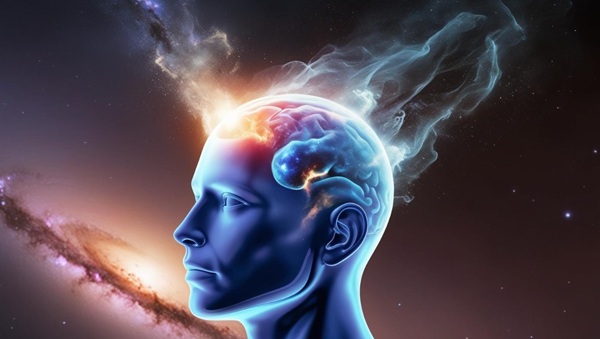|
 Consciousness arising out of a lifeless, mindless explosion of nothing? |
|
This is clearly Dawkin's way of re-stating his view that there is no God, because God's universe is quite different from Dawkins'. God's universe is of course created by God with super-intelligent design, purpose, meaning, no evil when created, and God created it so he could show love to man, the pinnacle of his creation (Ps 8.5), and man could show love back to God. So Dawkins' assertion about the meaninglessness and purposelessness of the universe can be falsified by demonstrating that his root assertion - that there is no God - is false. The "Godless universe" of the atheist necessarily denies the biblical creation account, and all that goes with it: God's intelligent design of it, as well as the many things that God has imbued his creation with which atheistic models such as the Big Bang and Darwinian evolution cannot explain. Things such as life, morality, consciousness. So let us take the atheistic worldview and assumptions, and determine if this question is consistent with the atheistic worldview, or if atheists are actually stealing from God, as Frank Turek would say, in their attempts to discourage people from the obvious truth: that there is a God, he created the universe, and is drawing you to himself in love. So let's revisit the statement and see how well it holds up to scrutiny given an atheistic worldview.
1. This question assumes there is such a thing as courage. If we are just an "accidental aggregation of stardust in an amoral purposeless blind pitiless indifferent cosmos" (as Apolojedi reminds us of another claim that Dawkins makes in "The God Delusion"), then how can such an accidental aggregation of stardust have courage? Does the dirt on the ground have courage? Does the wood or brick of your house have courage? If we are just an "accidental aggregation of stardust" why should humans have courage? 2. There is an implication that courage is good. Why is courage good? And how could it be "good" in a universe where there is no evil and no good? And how did lifeless stardust become conscious allowing an ability to recognize "personhood" and that a person could have courage? And how could stardust gain morals (do rocks have morals?) - and become moral enough to know about "goodness" and "courage"? Atheist, are you not borrowing against the qualities God has put into his creation to make such atheistic assertions? 3. There is an implication that there is such a thing as a "cold harsh reality". That is clearly something bad. But how can there be something bad in a universe where there is "no good", "no evil" and thus nothing can be "bad"? 4. "Cold Harsh Realities" point to a clear gradation of goodness and evil. Thomas Aquinas is famous for his Five ways or proofs for the existence of God. The fourth way is from the clear gradation of goodness in things. So by claiming there are "cold harsh realities", you're also affirming there are non-cold harsh realities, which are better than the "cold harsh realities." And if there are both good and bad realities, clearly there is a gradation, thus proving Aquinas' point. So in claiming there are "cold harsh realities" you are affirming one of the classical proofs of the existence of God - which of course makes the statement self-contradictory. 5. The atheistic worldview cannot explain the obvious hallmarks of a God created universe, things like the origin of life (and thus why you're alive), the origin of consciousness, (and thus why you are self aware and can notice anything about the universe) or the origin of morality, (and thus why you have sense of right and wrong; and have a basis for talking about "cold harsh realities"). I could go on with the
inconsistencies, but these five are sufficient to make these two
points 1. The question itself undermines an atheistic worldview and
2. The question is self contradictory - it points to one of the
proofs for God. I'm neither a psychiatrist nor a psychologist, but
since the questioner feels free to make unfounded assertions about
theists in general, and Christians in particular (since they are
almost always the target of atheistic ire) let me make a well
founded observation about those making this assertion. That
assertion is this:
What is Jesus saying? Is he advising people to disfigure themselves? No. He is using hyperbole to drive home the point that you need to take whatever steps are necessary to stop sinning - stop your disbelief - and turn to God. Because the only alternative to belief in God and life with him through Jesus, is disbelief in God, rejection of Jesus, and an eternity in hell with satan and his angels. (Matt 25.41) That is the cold hard truth that atheists are trying to run away from. And as we see so often from people trying to deflect the truth, they reflect the sins they themselves are doing on thier opponents or enemies.
Duane Caldwell | March
26, 2025 Image:
|